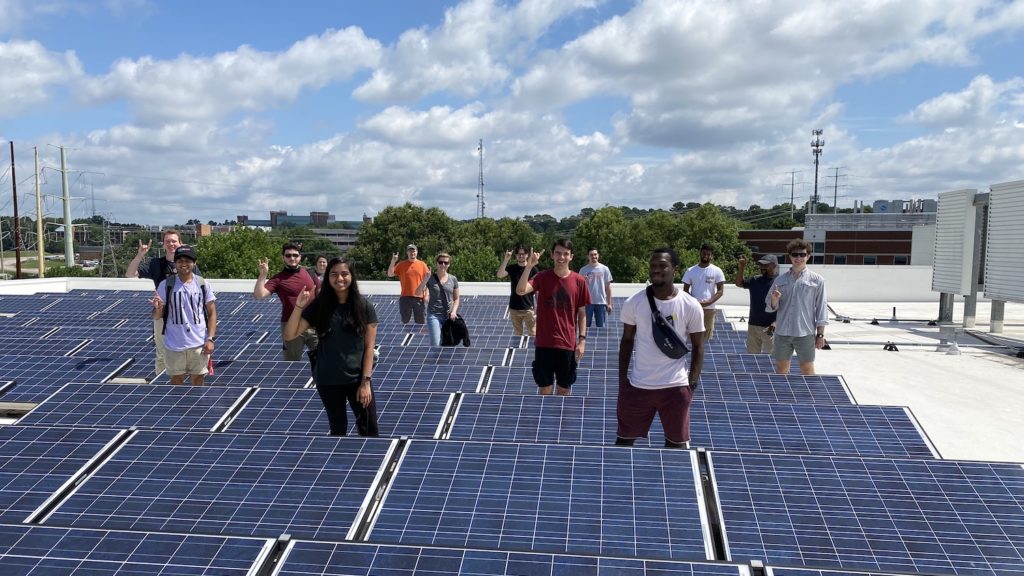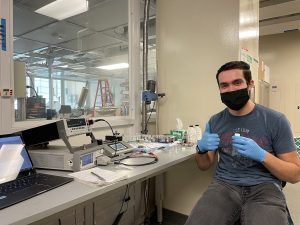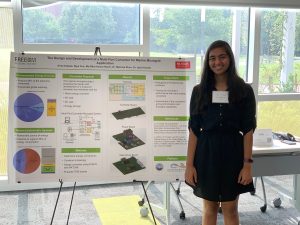
While the summer of 2020 kept many students home, undergraduate engineering students from across the nation made the most of this summer through the Research Experiences for Undergraduates programs, including two at the College of Engineering.
Founded through funding from the National Science Foundation, the College’s REU included programs run by the Advanced Self-Powered Systems of Integrated Sensors and Technologies (ASSIST) Center and Future Renewable Electric Energy Delivery and Management (FREEDM) Systems Center. ASSIST, established in 2012, offers undergraduate students research experience in self-powered, wearable technology for health and environmental monitoring. The FREEDM Systems Center, established in 2009, offers undergraduate and graduate researchers experience in large-scale systems and power electronics.
The programs also offered a variety of professional development opportunities for students throughout the summer to further engage them in the engineering field.
 The REUs were canceled for the summer of 2020 due to COVID-19. This summer, the two programs hosted 17 students, with eight working with FREEDM and nine working with ASSIST. While the majority of students were able to attend the program in person, some opted to stay in their home states.
The REUs were canceled for the summer of 2020 due to COVID-19. This summer, the two programs hosted 17 students, with eight working with FREEDM and nine working with ASSIST. While the majority of students were able to attend the program in person, some opted to stay in their home states.
“A lot of projects are hands-on, so last summer we were not set up to do anything virtually,” said Terri Kallal, the education and industry coordinator for the FREEDM Systems Center. “This year, we were excited to see our students again through a hybrid style where a few students have chosen to work remotely while others are on campus again and get to interact with each other more.”
To ensure the safety of students, faculty and staff during the 10-week programs, parameters such as mask wearing and social distancing were put in place.
Student projects covered topics such as isolated DC-DC converters, developing and testing wearable device technology for asthma exacerbation detection, and optimizing and improving the efficiency of a sensor used to detect stress and various mental illnesses through a biochemical found in sweat.
The program helped solidify a passion for engineering for students like Jamie Casseday, a nontraditional sophomore at Wake Technical Community College who is studying engineering and worked with ASSIST.
“During an internship, my mentors recommended that I research summer REU programs to see if I would be interested. As soon as I saw the ASSIST program, I knew I wanted to be part of it,” said Casseday. “The ASSIST REU program helped solidify my passion for the field and gave me the confidence to continue on my current path.”
Other students saw the program as an opportunity to get further involved in research while also investigating what they might want to do after graduation. This includes Ann Truong, a sophomore electrical engineering major at the University of California, San Diego who spent the summer with the FREEDM Systems Center.
“As a student that came in with no prior research or internship experience, I think that this program helped me understand what research actually entails,” said Truong. “That, in turn, will help me decide whether or not I want to pursue a graduate degree. While I still don’t know if research is something I’d want to do in the future, I’m still glad for the experience — I learned a lot.”
 Students and their mentors presented their research during two events: the NC State Undergraduate Research & Creativity Symposium on July 29, and the Centers’ Summer Research Symposium on July 30. Both events were interactive poster symposia open to the public and hosted in person with virtual options.
Students and their mentors presented their research during two events: the NC State Undergraduate Research & Creativity Symposium on July 29, and the Centers’ Summer Research Symposium on July 30. Both events were interactive poster symposia open to the public and hosted in person with virtual options.
“We were excited for our students as it was a unique opportunity to listen to what other people had been doing and learn from each other while they also got to talk about their own research and to network with others in their field,” said Elena Veety, education director & operations manager for the ASSIST Center. “We were excited to at least be in one space together, and to return to something that kind of looked like our old normal.”